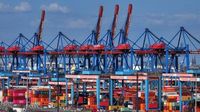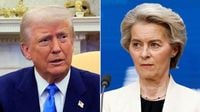On Monday, July 14, 2025, European Union trade ministers convened in Brussels to address the escalating trade tensions following U.S. President Donald Trump's announcement of a 30% tariff on imports from the EU, set to take effect on August 1. This move, which also targets Mexico, has been met with strong condemnation from EU officials, who described the tariffs as "absolutely unacceptable" and warned of severe economic repercussions on both sides of the Atlantic.
EU trade representative Maroš Šefčovič emphasized the gravity of the situation, stating that a 30% tariff or anything beyond that level would practically prohibit trade as it stands. "If (the tariff) stays 30 (percent) plus, simply trading as we know it will not continue, with huge negative effects on both sides of the Atlantic," he said. Šefčovič reiterated the EU's preference for a negotiated solution, expressing confidence that diplomacy remains the best path forward. "I'm absolutely 100% sure that a negotiated solution is much better than the tension which we might have after August 1," he told reporters.
The tariffs threaten to make a wide range of European goods more expensive in the U.S., including French cheese, Italian leather, German electronics, and Spanish pharmaceuticals. The EU, which is America's largest trading partner and whose bilateral trade with the U.S. was worth an estimated €1.68 trillion ($1.96 trillion) last year, faces a significant risk to this economic relationship. The disruption of essential transatlantic supply chains is a major concern, as highlighted by European Commission President Ursula von der Leyen, who warned that the tariffs could severely destabilize economies across Europe.
Von der Leyen also conveyed the EU's readiness to adopt "proportionate countermeasures" if the tariffs are imposed, though Brussels has currently suspended retaliatory tariffs scheduled to begin on July 14. This suspension, extending until August 1, is intended to allow more time for negotiations with the Trump administration, with hopes of reaching an agreement before the tariffs take effect. She stated, "Few economies in the world match the European Union's level of openness and adherence to fair trading practices. We will take all necessary steps to safeguard EU interests, including the adoption of proportionate countermeasures if required."
Denmark's Foreign Minister Lars Løkke Rasmussen, whose country currently holds the EU presidency, echoed this sentiment, underscoring the bloc's unity and resolve. "The EU remains ready to react and that includes robust and proportionate countermeasures if required and there was a strong feeling in the room of unity," Rasmussen told reporters. He further remarked, "If you want peace, you have to prepare for war, and I think that's where we are. So, of course, we shouldn't impose countermeasures at this stage, but we should prepare to be ready to use all the tools in the toolbox."
Italy’s Foreign Minister Antonio Tajani confirmed that the EU has formulated plans to target U.S. goods worth approximately $24.5 billion in retaliation. Moreover, EU trade officials have been finalizing a second, more extensive list of tariffs targeting about €72 billion ($84 billion) worth of American imports, including iconic products such as Boeing airplanes and Kentucky bourbon. This list was shared with member states on July 14, though national representatives have yet to vote on it.
The American Chamber of Commerce to the European Union, representing major U.S. companies operating in Europe, cautioned that Trump's tariff plan could "generate damaging ripple effects across all sectors of the EU and US economies." The announcement has already impacted European markets, with stocks falling on July 14, particularly in sectors like automotive and alcohol.
German Chancellor Friedrich Merz voiced his alarm, warning that such steep tariffs would "hit the German export industry to the core." Meanwhile, Dutch Prime Minister Dick Schoof described the tariffs as "very concerning and not the way forward," affirming the EU's commitment to a united and resolute approach in negotiations.
Despite the heightened tensions, President Trump indicated openness to continued talks. Speaking from the White House on July 14, he noted, "They would like to do a different kind of a deal, and we're always open to talk. We are open to talk, including to Europe. In fact, they're coming over. They'd like to talk." This softer tone contrasts with his earlier remarks in April, when he accused the EU of unfair trade practices and stated the bloc was "formed to screw" America.
Trump’s administration has pursued a strategy of imposing or threatening tariffs globally to address the U.S. trade deficit and revitalize domestic manufacturing. Following the imposition of 20% tariffs on EU goods in April, which were later paused, Trump had threatened to raise tariffs to 50% if negotiations did not progress. The current 30% tariff announcement came after the 90-day pause expired, signaling a renewed push in his trade policy.
U.S. National Economic Council Director Kevin Hassett confirmed on July 14 that trade talks with the EU, Canada, and Mexico remain ongoing. "I think that the president has set a deadline so that everybody gets the clarity that you all crave by the beginning of August," Hassett told reporters, highlighting the urgency of the situation.
Mexico, also targeted by the 30% tariff, is actively negotiating alternatives through a bilateral working group, according to its economy ministry. This reflects a broader pattern of the U.S. seeking to recalibrate trade relationships with key partners.
Amid these developments, the EU is also pursuing new trade agreements to diversify and strengthen its economic ties worldwide. Šefčovič pointed to a recently signed economic partnership with Indonesia and upcoming talks with the United Arab Emirates as examples of the bloc's efforts to open new markets. The EU leadership plans to attend a summit in Beijing later in July and is courting other Pacific nations, including South Korea, Japan, Vietnam, Singapore, and the Philippines.
The stakes are high. The EU and the U.S. together represent nearly 30% of global trade in goods and services, and a prolonged trade war could have far-reaching consequences for global economic stability. While the EU remains hopeful for a negotiated settlement, it is clear that preparations for a robust response are well underway, underscoring the complex interplay between diplomacy and economic strategy in this transatlantic relationship.


